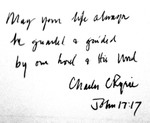All this week I’ve been pontificating about study Bibles, examining their history from the sixteenth century to the early twentieth century to the last few decades. After that I asked if the advent of Bible software had made the study Bible obsolete, and concluded that quite the opposite is true: Bible software is actually opening up new possibilities for the study Bible. In today’s post, I want to close out this series by offering a few anecdotes about my own experiences with study Bibles and their authors. Basically, this post is meant to offer a little light-hearted Friday entertainment.
A multi-purpose resource. Before heading to college, I invested a decent amount of cash in a good quality leather-bound NIV Study Bible. It remained my primary Bible for many years, and I still have it on my shelf. This study Bible was very helpful to me both in my classes and in the campus ministry I became involved with, and I have fond memories of reading it while lounging on Landis Green. I also remember that it doubled as a very comfortable pillow. When I was finished reading, I would lay back on the grass, place it under my head, and doze in the sunshine. Some might excoriate me for putting my Bible to such practical use, but it did make me appreciate that Bible all the more. That’s the one function of a print study Bible even Accordance can’t duplicate!
 Note to self: Ask Dr. Ryrie for the NASB! Some years ago I visited Dr. Charles Ryrie in his home and helped him with his installation of Accordance. Before I left, he was kind enough to show me some of his rare book collection, including a first English edition of Calvin’s Institutes and a Luther hymnal signed by no less than Philip Melanchthon. Then he offered me a signed copy of his study Bible in my choice of translation. Up to that point, I think he had been somewhat impressed with my knowledge of Accordance and my enthusiasm for church history, but I apparently blew it when I chose a translation other than the NASB. He gave me the translation I asked for and signed it for me, but not before I saw a look of mild disapproval cloud his features. Oops!
Note to self: Ask Dr. Ryrie for the NASB! Some years ago I visited Dr. Charles Ryrie in his home and helped him with his installation of Accordance. Before I left, he was kind enough to show me some of his rare book collection, including a first English edition of Calvin’s Institutes and a Luther hymnal signed by no less than Philip Melanchthon. Then he offered me a signed copy of his study Bible in my choice of translation. Up to that point, I think he had been somewhat impressed with my knowledge of Accordance and my enthusiasm for church history, but I apparently blew it when I chose a translation other than the NASB. He gave me the translation I asked for and signed it for me, but not before I saw a look of mild disapproval cloud his features. Oops!
How Important is the Choice of Translation? Dr. Ryrie wasn’t the only professor who had strong feelings about which translation is best. When I was in seminary, several of my professors were writing the notes for a new study Bible which was originally slated to be published with one of the latest translations. As I understand it, contractual issues eventually led to its being published with a different translation—one some of the professors contributing to the project were not particularly excited about. I imagine it would be frustrating to help create a study Bible and then have to use it with a translation you would not normally choose. Thankfully, Accordance users can pair any study Bible with any translation they like, so those professors don’t have to be frustrated any more.
Well, those are all the study Bible-related anecdotes I have to offer. I hope you’ve enjoyed this series about the genre.

